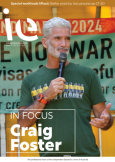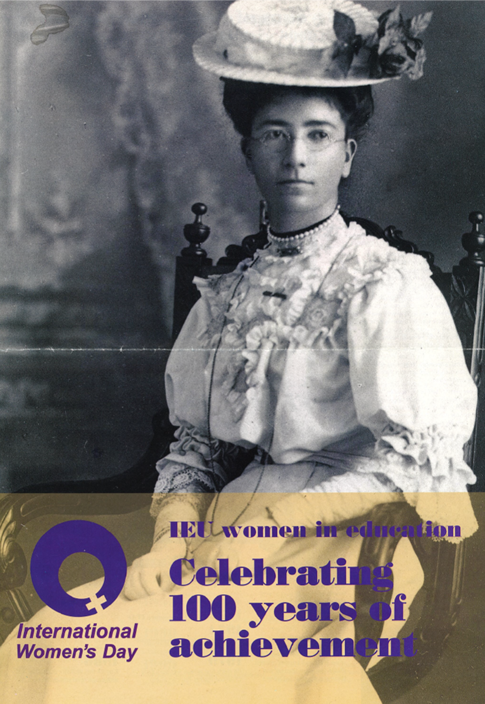Reflecting on the past century
While it is certainly important to reflect on the past 25 years, it is also appropriate to consider the gains for Australian women and their unions, at work and in the community, over the century since the last major pandemic, the ‘Spanish Flu.’
Back in 1920 – although ‘white’ Australian women had the vote since 1902 and the first stirrings of International Women’s Day had occurred – no women had yet been elected to Federal Parliament, women’s wages were at 54 per cent of the male rate and there was still a ban on married women working in the public service.
Inspirational women leaders such as Muriel Matters, a courageous activist and teacher born in Adelaide in 1877, had been making a significant contribution to women’s rights. In 1910 Matters secured a resolution from the Australian Senate to the British Prime Minister outlining the benefits of the vote for Australian women. In education, Matters campaigned for the education of the poor and was an advocate for the Montessori educational approach.
As for women in the non government education sector, they were beginning to organise with initiatives in various states to engage with their own unions and with the broader union and feminist movements.
In Queensland, beginning with the foundation of the Assistant Mistresses Association in 1920, the now IEUA-QNT has fought for the rights of working women to be paid fairly and equally, to be treated respectfully in the classroom and beyond, and to be recognised as leaders of the profession. In the 1980s the Working Rights of Women Committee (WROW) was formed by a number of outstanding women activists, one of whom, Norma Nicholson, has been described by the current IEUA-QNT Secretary Terry Burke as having “redefined the agenda of our union at the time.”
In NSW and ACT, female teachers at private girls’ schools became active to join with male colleagues to form in 1966 the Assistant Masters and Mistresses Association which became the Independent Teachers Association in 1972. At about that time, current IEUA NSW/ACT Officer, Liz Finlay, was actively involved with teachers in Catholic schools gaining industrial rights, including payment for co-ordinators.
While the struggle for pay equity remains ongoing, especially in the early childhood education sector, at the national level between the 1950s and the 1970s, union women were at the forefront of the campaign for equal pay.
Gains made towards equal pay
Unfortunately, it took a long time for women in Australia to receive equal pay, with over 25 years from a UN Convention of 1951 until the various equal pay decisions by the Australian Conciliation and Arbitration Commission in the early 1970s. These steps included:
In 1951 a convention by the International Labour Organisation of the United Nations recommended “equal remuneration for men and women workers for work of equal value… with a view to providing a classification of jobs without regard to sex.”
In 1960 equal pay for work of equal value was awarded, although specifically female work was not included.
In 1969 the Australian Council of Trade Unions (ACTU) ran a test case to remove the 25 per cent difference between pay rates. The Commission ruled that women should begin to receive 85 per cent of the male wage.
In 1972 the Arbitration Commission awarded equal pay - 100 per cent of the male wage. The decision meant that women who were performing the same work as men should get the same award rate of pay. There could no longer be lower female rates for the same job. The Commission’s decision automatically applied to women under federal awards but only covered about 40 per cent of women in the workforce. This resulted in campaigning by unions to change the various state awards too – a complicated process because claims had to be formally heard on a state by state basis.
In 1973, after the election of the Whitlam Government, the Commission set a minimum wage for all adults and in 1974 it dropped the concept of ‘family support’ as part of the wage system.
Some IEU members will have particular memories of union women equal pay activists campaigning in Melbourne outside Trades Hall and the Conciliation and Arbitration Commission in the 1960s and 1970s. Melbourne based activist Anna Stewart, remembered today through the Anna Stewart Memorial Project for training for women in unions, campaigned to have sexual harassment recognised as an industrial issue and also assisted with the ACTU’s Maternity Leave Test Case which in 1969 gained 12 months unpaid maternity leave.
Today in Victoria ‘We Are Union Women’, with strong engagement by IEUA VicTas Branch women members, continues to play a major role in advocating for women’s rights at work (including ‘WRAW Chats’) and especially in countering gendered violence.
Since the gains of the 1970s, women in all IEUA Branches have campaigned for paid parental leave, flexible work arrangement options for parents and carers, pay equity, safe and respectful workplaces, and to end unfair exemptions in anti-discrimination laws.
Campaigning with other unions
IEUA women were involved in achieving Australia’s first national paid parental leave scheme, which was introduced by the Gillard Government in 2011, and in contributing to the recent Inquiry by the Australian Human Rights Commission into Sexual Harassment in Australian Workplaces. Strong IEUA women members join with other union women in events such as International Women’s Day, Equal Pay Day and the International Day for the Elimination of Violence Against Women.
There is also a strong engagement by IEUA women in broader campaigns in support of the rights of Aboriginal and Torres Strait Islander Australians, for refugees and asylum seekers, for the LGBTQI community and for action on climate change.
While women’s committees, conferences and forums have long been a feature at Branch levels, the IEUA National Women and Equity Committee held its first Building Our Leadership Development (BOLD) Conference in Canberra in 2017 and held a second Conference at Manly in Sydney in 2019. The national BOLD group continues to engage with members via webinars, a Facebook group and a BOLD newsletter. At this challenging time, the BOLD program provides opportunities for IEUA women to develop, empower and lead.
Again, within the context of COVID-19, what are the key issues for IEUA women and their union going forward? The pandemic has deepened pre-existing inequalities, exposing vulnerabilities in social, political and economic structures. In IEUA Branches, this has been seen in the impact on support staff, casual employees and on the early childhood education sector, all of which affect mainly women. The union in NSW, Victoria, South Australia and Queensland have been actively campaigning against stand downs of staff, and have taken cases to the Fair Work Commission where it was necessary and appropriate.
Some vulnerabilities include:
- the overall greater economic insecurity of women
- the gender pay gap (currently 13.9 per cent) and generally lower superannuation balances for women; thus greater long term adverse impact of accessing superannuation early
- inequalities in regard to expectations around unpaid domestic and care work
- gendered violence in the home and the workplace.
IEUA Assistant Secretary Christine Cooper said recently in IEU Speaks on COVID19 is not Gender Neutral: “COVID-19 presents governments with an opportunity to effect systemic changes that could protect women from bearing the heaviest brunt of shocks like these in the future. As union members, we must campaign for this to occur. By campaigning for women and girls to be placed at the centre of economies, we can fundamentally support a more rapid recovery, drive better and more sustainable development outcomes for all and set communities on the path to achieve gender equality.”
Pam Smith, Assistant Secretary IEUA NSW/ACT, with thanks to Christine Cooper, Caryl Rosser, Therese O'Loughlin and Louise Firrell for their invaluable research and contributions.












































































































































